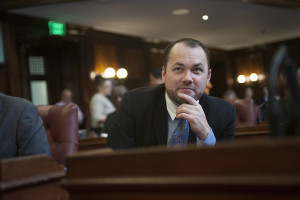
Councilmember Corey Johnson at a Stated Meeting of the New York City Council. Image credit: William Alatriste/New York City Council
Privately-owned open space will be converted into a new City park that includes an aptly-placed Aids memorial across the street from the former-Saint Vincent’s Hospital. On August 13, 2015, the City Council approved West Village Residences, LLC and the Department of Parks and Recreation’s application to transfer ownership of WVR-owned open space to the City and officially map the space as City parkland. The open space is bounded by Seventh Avenue South, West 12th Street, and Greenwich Avenue, and its main feature will be New York’s largest AIDS memorial. The park officially opened on August 21st, and the AIDS memorial is expected to be completed by the end of the year.
In 2011, Rudin Management Company, Inc., and Global Holdings, Inc., purchased St. Vincent’s Hospital’s lower Manhattan campus and formed WVR to be the entity responsible for developing the property. WVR’s initial proposal was to build a primarily-residential, mixed-use development on the east side of Seventh Avenue and privately-owned, publicly-accessible open space on the West side. Local residents opposed the project as being uncharacteristic of the neighborhood, and sought a new hospital to replace St. Vincent’s.
Subsequently, the Council approved revised development plans, which presented a compromise that provided for the former-hospital to be replaced with new luxury condominiums, and for the open space to be converted into a City park that incorporated New York’s first prominent and free-standing AIDS memorial. The compromise was reached in large part due to the efforts of Christopher Tepper and Paul Kelterborn, two urban planners who founded New York City AIDS Memorial, Inc. in 2011 with the goal of designing and producing the AIDS memorial. Studio a+I, a Brooklyn architecture firm, created the final design chosen for the memorial.
On August 11, 2015, the City Council Subcommittee on Zoning and Franchises heard favorable testimony submitted by representatives of Rudin, WVR, and the Department of Parks and Recreation. Melanie Meyers, a partner at Fried Frank’s New York office and representative of WVR, testified that the park was designed to be reflective of the West Village/Greenwich Village’s character, and noted that WVR would remain responsible for the maintenance of the park after the park’s ownership is transferred to the City.
Council member Corey Johnson, who represents the 3rd Council District in which the park is located, noted that the open space was used previously by St. Vincent’s Hospital to store oxygen tanks and other hospital equipment, and was “very depressing” and “dilapidated.”
To Council member Johnson, the most important aspect of the park is the AIDS memorial. As a dedicated LGBT rights activist, he has provided significant support and secured public funding towards the construction of the AIDS memorial. Council member Johnson stated, “a memorial to those we’ve lost to HIV and AIDS at this site is most poignant and appropriate,” most prominently due to its location across the street from the former St. Vincent’s Hospital, which “housed the first and largest AIDS ward on the East Coast in the United States, treating victims when they were shunned elsewhere.” Further, the AIDS memorial will be located only one block from the City’s LGBT center, which Council member Johnson viewed as the “birthplace of HIV and AIDS activism in New York City.”
Subcommittee Chairman Donovan Richards congratulated Council member Johnson on the AIDS memorial project that he successfully spearheaded. The August 11, 2015 hearing concluded with a unanimous vote of approval. The following day the Committee on Land Use approved the Uniform Land Use Review Procedure application unanimously.
City Council: LU 0264–2015 (Aug. 13, 2015).
By: Jessica Soultanian-Braunstein (Jessica is the CityLaw Fellow and a New York Law School Graduate, Class of 2015)


The ultimate resolution of the WVR development and the park to the west was the result of the efforts, primarily, of Protect the Village Historic District, which battled to downsize the residential project and preserve the historic National Maritime Union headquarters (now the free-standing emergency facility) since 2008. Much credit also goes to the Rudin organization and North Shore Long Island Jewish Hospital.
The AIDS memorial, while very important, was largely an afterthought, and the “compromise” (if want to call it that) was to shrink the original proposal that would have occupied the entire Triangle site to a relatively small part of the Triangle on the west.